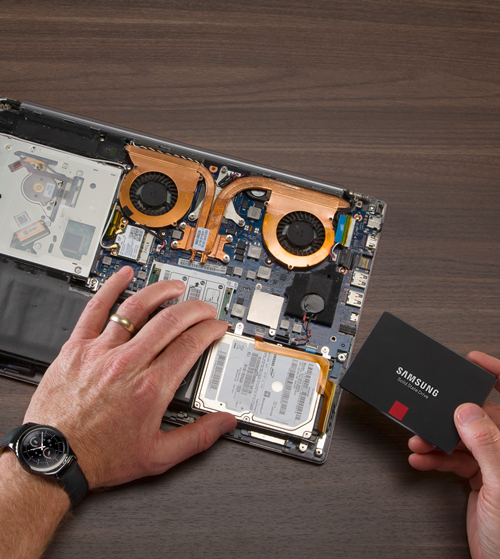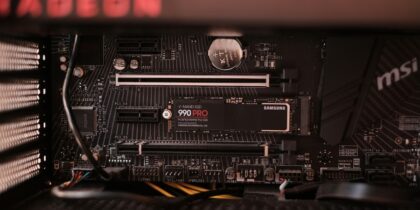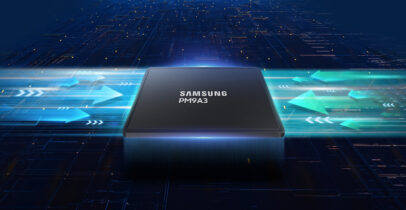Military data storage is always a concern, whether from a personal or operational perspective. Indeed, federal data security is always top of mind for the government as it sets funding and modernization priorities for the future.
In November 2022, the U.S. Government Accountability Office released a study1 that found that enhanced attention is needed to better ensure Department of Defense (DOD) cybersecurity breaches are reported and shared. Given the fact that seven out of every 102 veterans and active duty members have been a victim of a cyberattack, military personnel have to constantly be aware of threats and ensure they are using the right technologies to protect their data.
These measures can include using a solid-state drive (SSD) to best protect their data when they are on base, in the field or at home. However, just any SSD won’t suffice. Military personnel must embrace military-grade SSDs and make sure they’ve upgraded their traditional hard disk drives (HDDs) to SSD.
Finding the right drive
When evaluating technology for military data storage, there are several items to consider since not all SSDs are created the same. Here are the key considerations that every military storage user needs to keep in mind.
Prepare for your storage upgrade
Which form factors and interfaces make the most sense for your company's storage needs? Download Now
Speed and performance
Accessing and transferring data quickly is even more critical in the military sector given that, in crisis situations, every second matters. Military storage solutions need to be reliable and consistent in their performance, too. Options such as Samsung 870 EVO and 870 QVO come with fast performance thanks to the drive design as well as the Samsung Intelligent TurboWrite technology. Both 870 EVO and 870 QVO come with 560/530 MB/s sequential speeds, making it that much easier to store and access data quickly. With military-grade SSDs, users in the field can get the information they need without having to wait crucial seconds for it to load.
Security
As the DOD study shows, data breaches are happening daily. They occur for a variety of reasons, including misconfigured software, social engineering and the loss of devices. Military data storage users can avoid this by utilizing a device that protects and encrypts data automatically. In addition, the devices should make erasing data just as easy and fast. Drives such as 870 QVO feature Samsung Magician software, which provides a host of security features including Secure Erase, allowing users to delete data in seconds. There’s also PSID Revert to allow users to wipe the device completely to factory settings, and government-grade Advanced Encryption Standard (AES) 256-bit encryption, which can be turned on and off depending on data needs.
Capacity
Consider a soldier in the field. They may need to use multiple applications at a time, each of which has its own data. Simply put: Larger amounts of data requires larger storage capacity. For military-grade SSDs, such as Samsung 870 EVO and Samsung 870 QVO, there are a wide variety of capacities to choose from. 870 EVO is available in 250GB, 500GB, 1TB, 2TB and 4TB, giving users plenty of room to grow. Samsung 870 QVO comes in 1, 2, 4 and 8TB configurations — currently the largest capacity available in SATA technology.
Durability
No matter where you’re on assignment — whether in the midst of a sandstorm in the Middle East or a snowstorm in the Arctic Circle — users must ensure the data is accessible and safe. Any SSD must be able to withstand shock, vibration and extreme temperatures, as well as last for a long duration of time. Both 870 EVO and 870 QVO are extremely durable and made to stand up to anything they might encounter in an office, in the field or at home. For example, 870 QVO doubles its reliability from 1,440 Terabytes Written (TBW) to up to 2,880 TBW thanks to a refined error-correcting code (ECC) algorithm.
At the end of the day, when it comes to selecting military-grade SSDs, the type of technology — as well as its features and functionality — will mean the difference between securely storing data and potentially being a part of a data loss or theft situation.
Find the right solid-state drive that fits your memory and workload needs. Learn more about how SSDs provide a reliable solution for managing large amounts of data in the public sector securely.
1 U.S. GAO. “DOD Cybersecurity: Enhanced Attention Needed to Ensure Cyber Incidents Are Appropriately Reported and Shared.” November 14,
2 USA Today. “Online scams targeting veterans and active duty members. Here’s how to protect yourself.” November 10, 2022.








